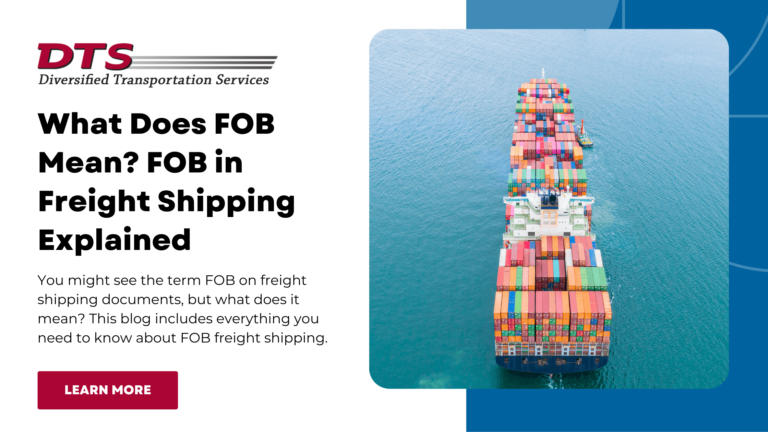
There’s a lot of terminology to get your head around when researching shipping options. Some of the terms we use are pretty self-explanatory — like proof of delivery — others take a little more explaining, like demurrage fees and trade show shipping.
Today’s post will look at “free on board” (FOB) meaning in shipping. In this article, you’ll learn what FOB shipping is, how it’s used, and why it’s important.
Free on board (FOB) shipping is a term used in international trade to indicate the point at which the responsibility and liability for goods transfer from the seller to the buyer. It defines who is responsible for the costs and risks of transporting goods from the seller's location to the buyer's destination. This is a crucial definition to make because it essentially lays out who is liable in the event that goods are damaged or lost during shipping.
The origin of FOB can be traced back to maritime shipping, where it applied to contracts for transporting goods by sea. It meant that goods were the buyer's responsibility once they had been loaded onto the ship. This would absolve the sender of any responsibility if the ship sank during its journey.
Over time, the concept of FOB has expanded beyond maritime trade and is now widely used in various modes of transportation, including air and land. It has become a common international trade term recognized and utilized by businesses and organizations involved in global commerce.
FOB was incorporated into the Incoterms® 2020 rules as one of four rules for sea and inland waterway transportation. Incoterms are widely used terms of sale that have been recognized and turned into official rules by the International Chamber of Commerce (ICC). The ICC has built a set of 11 rules, including FOB, that define responsibilities for sellers and buyers involved in international transitions. It’s worth noting at this stage that these Incoterms do not cover all conditions of sale and should be used as part of a contract of sale.
FOB is one of the most used Incoterms. However, you may sometimes see it referred to as “freight on board.” While “freight on board” is not an official term, the two terms are often used interchangeably. Since “freight on board” is not part of recognized codes like Incoterms, using “free on board” will help avoid any confusion.
Alongside occasionally seeing “freight on board,” there are four different variations of FOB that will be listed on shipping documents that you should be aware of. Each means something slightly different, but the distinction is incredibly important. The variations are:
Key distinctions here are place of origin vs. place of destination, which defines who is responsible for the shipment, and freight collect vs. freight prepaid, which indicates responsibility for any costs associated with the shipment.
Anything marked “FOB [place of origin]” indicates that the buyer assumes ownership of the shipment as soon as the carrier collects and signs over the goods. This will remove any responsibility for the shipment from the seller, ensuring they are not liable in the event of damage or loss during transit.
Shipments labeled “FOB [place of destination]” remain the seller's responsibility until the buyer receives and signs for the delivery. This means that the buyer doesn’t have to worry about damage or loss during transportation, and the seller would be required to replace any goods.
Freight collect and freight prepaid are fairly self-explanatory distinctions that indicate who is responsible for freight charges. Freight collect indicates that the person receiving the shipment will be required to take on the charges, whereas freight prepaid is used for shipments that are already paid for before they are sent out.
This distinction also refers to who is responsible for any costs involved in loss or damage to the goods in transit.
As we have discussed so far, FOB is an essential part of the shipping process. Without FOB designations, we risk falling into muddy waters when it comes to lost or damaged shipments.
As an Incoterm, FOB is a widely recognized way of defining responsibility for goods during freight. This can be highly advantageous for sellers looking to reduce risk and loss when taking on international transactions. Likewise, it can help buyers receive a higher level of protection when they make a purchase.
FOB is also incredibly important in the event a shipment is damaged. Some receiving docks will simply refuse to accept clearly damaged goods to avoid taking responsibility for the damage. However, goods shipped with the FOB [place of origin] designation are the buyer's property from the moment they ship. This means that if a receiving dock refused the shipment, they’d be sending goods back to the seller, who has no legal responsibility for the shipment. This could result in further damage or loss and a lot of paperwork.
Sometimes it feels like the more you dig into the terminology and minutia of freight shipping, the more confusing it becomes. But don’t worry — at DTS we aim to make shipping easy to understand for everyone.
The DTS blog is packed with handy guides like this one to help you navigate the often complex terminology, from consolidated shipping to drayage, and everything in between.
Looking for an extra helping hand? Be sure to get in touch for help demystifying the shipping process or help handling shipping on your behalf!
Whether you're a company looking to improve one facet of your supply chain, your entire supply chain, or simply looking for a transportation and logistics consultation, we can help.